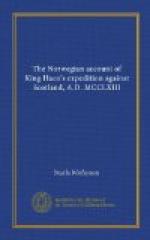IS
Inscribed.
* * * * *
Exactly one hundred years ago this Translation of the Norwegian Account of Haco’s Invasion of Scotland first issued from the press.
Since then, amid much literature upon the subject, it has always held a most important place in the eyes of the student of early Scottish History.
As an authentic source of information it has been eagerly sought after, but it has an additional attraction in the graphic pictures which it presents of the various perils by land and sea encountered by the hardy Norsemen.
The translator’s valuable notes are given in extenso, and for easier reference are transferred from the end of the work and printed on the pages to which they belong.
* * * * *
PREFACE.
(1782.)
The editor, from some particular advantages he enjoyed, was encouraged to collect such inedited fragments as might elucidate antient history. He, lately, published “Anecdotes of Olave the Black, king of Man;” and now lays before the learned the Norwegian account of Haco’s celebrated expedition against Scotland.
It was the editor’s intention to have given a succinct detail of the descents made by the northern nations upon the British isles, but an increase of materials induced him to reserve that subject for a future work. At present, therefore, he thinks it sufficient to premise that the AEbudae were, long, the cause of much dispute between various kingdoms. They seemed naturally connected with Scotland; but the superior navies of Lochlin rendered them liable to impressions from that quarter.
The situation of the Kings of the Isles was peculiarly delicate; for, though their territories were extensive, yet they were by no means a match for the neighbouring states. On this account, allegiance was extorted from them by different Sovereigns. The Hebridian Princes considered this involuntary homage, as, at least, implying protection: and, when that was not afforded, they thought themselves justified in forming new connexions more conducive to their safety.
The Alexanders of Scotland having united Galloway, then a powerful maritime state, to their dominions, began to think of measures for obtaining a permanent possession of the Hebrides by expelling the Norwegians. The preparatory steps they took were first to secure the Somerled family, and next to gain over the insular chieftains. Haco was no less earnest to attach every person of consequence to his party. He gave his daughter in marriage to Harold King of Man; and, on different occasions, entertained at his court King John, Gilchrist, Dugall the son of Rudri, Magnus Earl of Orkney, Simon bishop of the Sudoreys, and the abbot of Icolmkil.
All this, however, did not effectually conciliate the Somerlidian tribe. The Norwegian Monarch, disappointed in his negotiations, had recourse to the sword, and sailed with a fleet, which both the Sturlunga-saga, and the Flateyan annals represent as the most formidable that ever left the ports of Norway.




